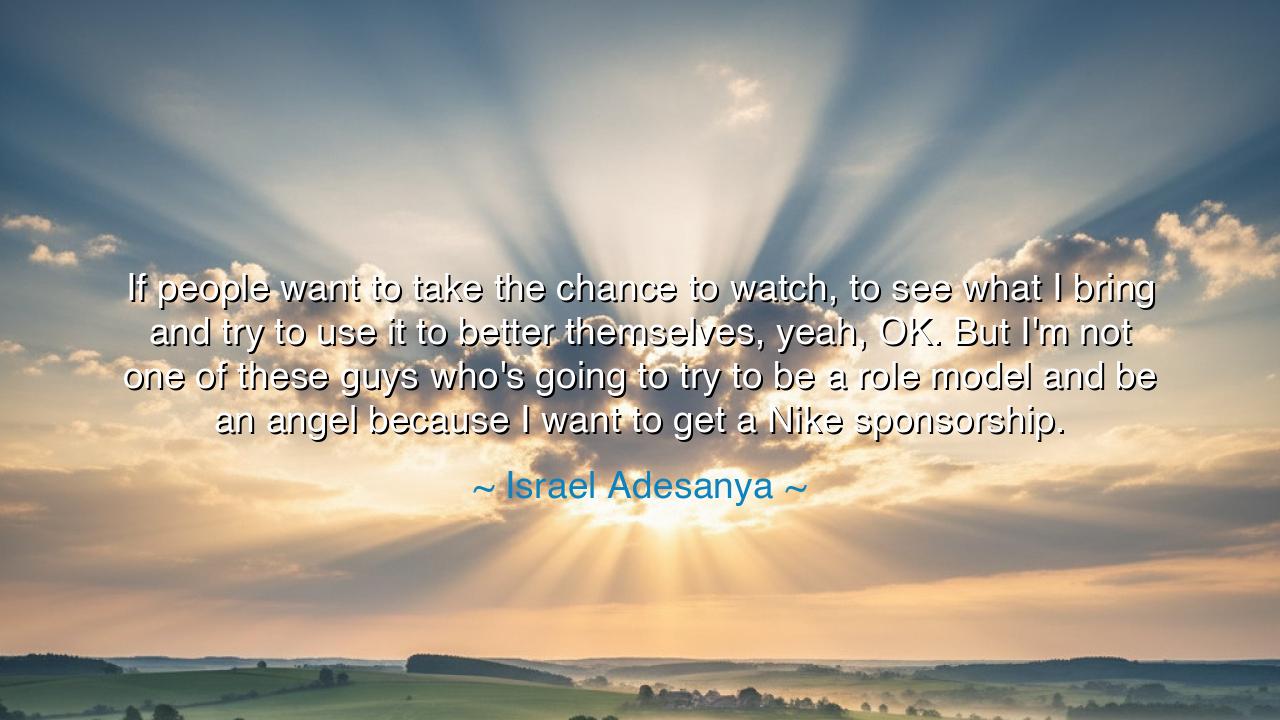
If people want to take the chance to watch, to see what I bring
If people want to take the chance to watch, to see what I bring and try to use it to better themselves, yeah, OK. But I'm not one of these guys who's going to try to be a role model and be an angel because I want to get a Nike sponsorship.






In the grand tapestry of life, where heroes rise and fall, there is a delicate balance between personal ambition and the expectations of the world. Israel Adesanya, a modern warrior of the ring, speaks a truth that resonates deeply in every age: "If people want to take the chance to watch, to see what I bring and try to use it to better themselves, yeah, OK. But I'm not one of these guys who's going to try to be a role model and be an angel because I want to get a Nike sponsorship." In these words, we hear the cry of one who understands that while the world may look to us for inspiration, it is not our purpose to mold ourselves to meet every external expectation. Instead, we must remain true to our own path and identity, for it is only through authentic living that we can truly inspire others.
The ancients, in their wisdom, understood that a true hero does not live for the approval of others. Achilles, the greatest of the Greek heroes in the Iliad, was not concerned with being a role model for the people of Greece. He fought for honor and glory, driven by his own sense of fate and desire for recognition. He was not an angel; he was a warrior, a man of raw ambition, who did not seek to fit into the mold that others had for him. Similarly, Adesanya’s refusal to be something he is not, simply for commercial gain, echoes the ancient principle that we must live our lives based on our truths, not the expectations of the masses.
In the age of ancient Rome, Julius Caesar was both revered and feared not because he sought to be a saint, but because he embraced the power of his identity and ambition. Like Adesanya, Caesar knew that the path to greatness was not to conform to the desires of the Senate or the plebeians but to boldly shape his own destiny. He knew that, as a leader, he could inspire through strength, strategy, and personal conviction. Caesar was no angel, nor did he seek to be one. His greatness came from his ability to stay true to his vision, even when it clashed with the ideals of others. Similarly, Adesanya acknowledges that his personal journey is about self-expression and growth, not about living up to the ideals that others may project onto him.
There is a profound wisdom in Adesanya's words. To be a role model is not necessarily to live according to a perfect ideal, but to live authentically, to show others that true greatness comes from embracing the full range of human experience—the strengths, the flaws, and the imperfections. Just as Socrates challenged the conventions of Athens, Adesanya challenges the modern expectation that athletes must fit into the idealized mold of public perfection. Socrates was not a saint, nor did he pretend to be. He sought only the truth and lived by it, teaching that wisdom comes not from pretending to be something we are not, but from embracing who we truly are.
Adesanya's journey is one of self-discovery, where he refuses to wear the mask of a perfect, marketable persona. His focus is on his craft, on becoming the best version of himself, not in the image that others may create for him. He challenges us to ask: What is the price of pretending to be something we're not? Just as Leonardo da Vinci never painted for fame or recognition, but to express his creative genius, Adesanya refuses to allow his true self to be shaped by external pressures. The Nike sponsorship may come or go, but the essence of a man is defined by his ability to stay true to his core—to express himself fully and to inspire not through perfection, but through the truth of his actions.
This timeless lesson is one of great importance. Authenticity is the bedrock upon which true inspiration is built. Adesanya shows us that while the world may look to us for guidance, we must not shape our identities to meet the desires of others. Rather, we must own our path, embrace our struggles, and live in a way that reflects our true selves. Like the ancient heroes—who lived not for approval but for honor—we must be willing to walk our own path, knowing that in doing so, we may inspire those who see the courage in authenticity.
In our own lives, let us take Adesanya's wisdom to heart. In a world that constantly asks us to conform, we must stand firm in the knowledge that our true strength comes not from meeting the expectations of others, but from living in a way that reflects who we really are. Authenticity is not just a gift to ourselves; it is a gift to those who watch us, who draw strength from seeing someone who is unafraid to be themselves, even when the world presses for conformity. Let us, too, show the world that true power lies not in pretending to be perfect, but in embracing our imperfections and using them as a foundation for growth. Only then can we inspire others—not through imitation, but through true self-expression.






AAdministratorAdministrator
Welcome, honored guests. Please leave a comment, we will respond soon